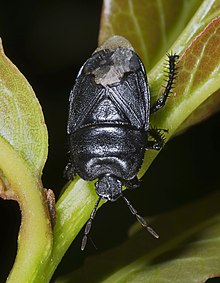Cydnidae
| Cydnidae Temporal range: [1]
| |
|---|---|

| |
| Cydnus aterrimus Type genus for the family | |
| Scientific classification | |
| Kingdom: | Animalia |
| Phylum: | Arthropoda |
| Class: | Insecta |
| Order: | Hemiptera |
| Superfamily: | Pentatomoidea |
| Family: | Cydnidae Billberg, 1820 |
| Genera | |
Cydnidae are a family of shield bugs, known by common names including burrowing bugs or burrower bugs.[2] In some older classifications, Cydnidae sensu lato includes the subfamily Thyreocorinae (now a separate family, Thyreocorinae), which are known commonly as "negro bugs" (early name to be avoided), or "ebony bugs", and/or the families Thaumastellidae and Parastrachiidae.[3][4] Though similar in appearance to a beetle at casual glance, they can be distinguished by both their piercing/sucking mouthparts, and wing configuration (beetle elytra are split directly down the back of the insect). Of some 750 species of burrower bugs, 27 are reported as crop pests, and six species are thought to feed on peanut.
In Goiás (Brazil) the flocks are observed in the rainy season, November to March, which coincide with the period in which adults of these insects are found in the soil. Currently the southwestern region of Goiás is the most attacked (Mineiros, Chapadão do Céu, Rio Verde and Jataí), south and southeast, in cotton, soybean, maize and pasture crops. Among the damages caused by the insect in the plant are: uneven growth of the plant, reduced growth, root lesions, large amount of dry leaves, reddish leaf, yellowing and subsequent dry; reduction of the stand, yellowing of the leaves and reduction of productivity.
Selected species[]
- Tritomegas bicolor
Fossil genera[]
- Subfamily Amnestinae Hart 1919
- † Lis et al. 2018 Burmese amber, Myanmar, Cenomanian
- † Yao et al. 2007 Yixian Formation, China, Aptian
- † Pinto and de Ornellas 1974 Crato Formation, , Brazil, Aptian
- † Yao et al. 2007 Yixian Formation, China, Aptian
- † Pinto and de Ornellas 1974 Codo Formation, Brazil, Aptian
- † Wang et al. 2019, Burmese amber, Myanmar, Cenomanian
- †subfamily Clavicorinae Popov 1986
- † Popov 1986 , Mongolia, Aptian
- † Popov 1986 Gurvan-Eren Formation, Mongolia, Aptian, , Russia, Hauterivian
- Subfamily Sehirinae Amyot and Audinet-Serville 1843
- † Popov 2019, Bembridge Marls, United Kingdom, Priabonian
References[]
- ^ Jerzy A. Lis; Barbara Lis; Ernst Heiss (2018). "Chilamnestocoris mixtus gen. et spec. nov., the first burrower bug (Hemiptera: Pentatomoidea: Cydnidae) in Upper Cretaceous Burmese amber". Cretaceous Research. 91: 257–262. doi:10.1016/j.cretres.2018.06.017.
- ^ "Cydnidae". . Retrieved 2007-03-09.
- ^ Dolling, W. R. (1981). "A rationalized classification of the burrower bugs (Cydnidae)". Systematic Entomology. 6 (1): 61–76. doi:10.1111/j.1365-3113.1981.tb00016.x. S2CID 84097067.
- ^ Yao, Yunzhi; Ren, Dong; Rider, David A.; Cai, Wanzhi (2012). "Phylogeny of the Infraorder Pentatomomorpha Based on Fossil and Extant Morphology, with Description of a New Fossil Family from China". PLOS ONE. 7 (5): e37289. doi:10.1371/journal.pone.0037289. PMC 3360028. PMID 22655038.
| Wikispecies has information related to Cydnidae. |
- Cydnidae
- Heteroptera families
- Heteroptera stubs